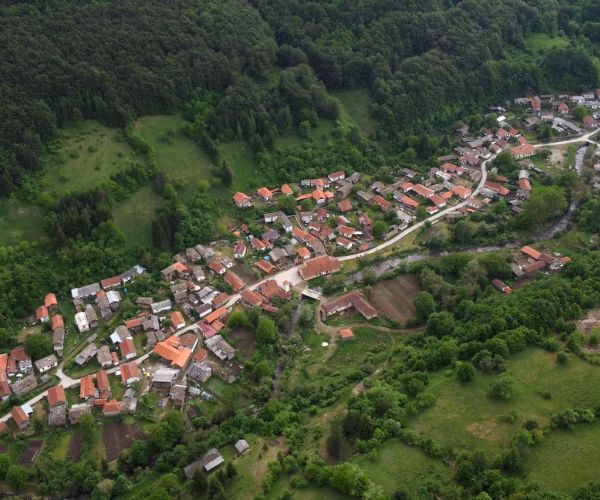Location: Stara planina (Old mountain), municipality of Pirot
Case study conducted by: dr Rastislav Vrbensky, Masaryk University, Czech Republic and dr Marija Babovic, University of Belgrade, Serbia
Time span of case: Since spring 2022 until present
Green SDGs focused on: SDG 6 (Clean water and sanitation), SDG 7 (Affordable and clean energy), SDG 11 (Sustainable Cities and Communities), SDG 12 (Responsible Consumption and Production), SDG 13 (Climate Action), SDG 14 (Life below water), SDG 15 (Life on land), SDG 16 (Peace, justice and strong institutions), SDG 17 (Partnerships for the goals)
Partners in the case: Citizen’s energy cooperative Elektropionir, Municipality of Pirot, citizens from two Stara planina villages Temska and Dojkinci.
Data sources in case analysis: Documents, interviews, observations (both in Belgrade and during the field trip to Stara planina in June 2023), mini-survey

‘Solarna stara’ initiative (2022-present) is a co-creation initiative implemented through cooperation between three stakeholders: citizen’s cooperative Elektropionir (a first energy cooperative in Serbia), as a lead project entity, city of Pirot, and citizens from two villages in Stara planina (Old mountain): Temska and Dojkinci.
The objective of the project is to place two solar plants on the roof tops of public buildings in two Stara planina villages (Temska and Dojkinci), with the multifold aims:
The basic idea of the project is to create the process of cooperation between citizens of Mesna zajednica which is the smallest unit of local community, usually of one or two villages, where citizens bring decisions on local investments and ask for the funds from municipality administration. The solar plants were placed on the rooftops of two public buildings (centers for culture) in two villages, which legally belong to the municipality of Pirot. Municipality of Pirot gave permission to install solar panels, but since the two buildings are not big consumers of electricity, it was decided to establish plant and not use panels in prosumer form. The energy produced will be sold, and the income will be invested in the local development initiatives proposed by citizens from two villages.
The whole pre-history of the co-creation initiative is marked by strong conflicts between citizens/activists and investors who planned to install over 80 mini hydropower plants on Stara planina rivers, and loss of trust in local government who was not very decisive or effective to support citizens. The resistance to mini hydro plants led to development of ecological uprising, large ecological movement which alerted public audience in Serbia and created strong pressure on local government to ban mini hydropower plants. Although the resistance was successful, the communities involved were still faced with challenges of underdevelopment, depopulation and mistrust in local and particularly national government. Solarna Stara project was described by project partners as ‘healing’ initiative, rebuilding the trust and creating sustainable mechanism of co-creation that will enable local communities to use solar energy as source of income to invest in local development.
Presently the project is in final stage. The solar plants were placed on the rooftops, the contractual relations defined, and what is left to see is how the income inflow in two local communities for their development projects would be implemented. The main project outputs are awareness raising on solar energy and capacity building, installed solar plants and innovative contractual arrangements between project partners. However, the project outcomes go beyond these:
In GOGREEN, we define the green SDGs as the following SDGs: SDG 6, SDG 7, SDG 11, SDG 12, SDG 13, SDG 14, SDG 15
This website uses strictly-necessary cookies. To read more about WordPress cookies, click here. Please click on the ‘Accept’ button to continue on to the GOGREEN Project site.